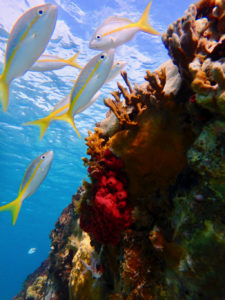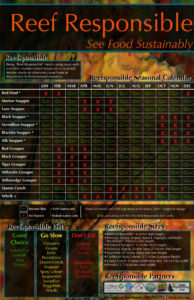
Organizers of Reef Fest are encouraging local restaurants to be active partners in efforts to restore and sustain the local marine ecosystem.
As a precursor to the April 14 event at Yacht Haven Grande, organizers held an educational seminar for local restaurants to explore the role they play.
Seafood is a critical issue to the Virgin Islands. Some species that used to be plentiful, like conch and grouper, are now commercially unviable. The conch served today in local restaurants is imported from as far away as Asia.
Imani Daniels, community engagement specialist for the Virgin Islands Experimental Program to Stimulate Competitive Research (VI-EPSCoR,) took the lead in organizing the event. EPSCOR is a territorial program of the national Science Foundation hosted by the University of the Virgin Islands. EPSCOR was awarded $20 million to stimulate Competitive Research in the US Virgin Islands.
Five prominent St. Thomas restaurant owners attended, as well as some of their executive chefs and staff. Those who spoke to the Source said the event was well worth their time, and increased their awareness of problems and solutions.
The key speaker at the event was Kemit-Amon Lewis, a conservation manager for the Nature Conservancy. Lewis has worked for eight years restoring the reefs of the Caribbean.
The restaurants in attendance were Brix Wine Bar & Bistro, Salt & Vinegar, Thirteen, The Twisted Cork Cafe, and Urban Eats. Some of these restaurants will also serve food and share their knowledge at Reef Fest.
An easy action for the restaurants to take is to make sure they do not buy certain species when they are out of season. Most fish have a mating season that lasts a few months. Not taking certain fish during their off-season has an immediate positive impact on populations.

There are mutually beneficial actions that can be encouraged between fishermen, restaurants, and consumers. Lionfish is an interesting example, in which biologists need help getting rid of this species that has invaded the Caribbean. Restaurants have demand for lionfish, as its long spines are the only dangerous thing on this otherwise tasty fish. A current problem is a lack of supply. Some fisherman who are catching lion fish accidentally in nets and traps are throwing the dead fish back into the sea, not realizing restaurants will buy them.
Brian Lewis, owner of the Twisted Cork, said he runs out of lionfish every week, and would buy more than the 35 pounds a week he currently finds. Vanessa Redwing, owner of Thirteen has the same problem – not finding as much as she would like to buy.
Kristy Llewellyn, owner of Salt & Vinegar, said she “would love to use more lion fish, but I need a source.”
She has heard fisherman in St. Croix might begin to ship to St. Thomas.
As more fishermen see the economic benefit of supplying lion fish, restaurants can add dishes to their menus, and encourage the already healthy demand. Other species, such as spiny lobster, need careful management in order to avoid the plight of conch. Rising prices indicate lobster have gotten more difficult to catch commercially. Lewis has observed prices since 1998, when lobster was $6 per pound. Although the price went up slowly over time, in the last three years it has gone up 40 percent. A strict adherence to not eating fresh lobster between May 1 and June 30 can help the population grow, and move prices lower.
Michael Norris of Urban Eats liked the focus on what fish to use. The locally occurring ciguatera neurotoxin is something chefs need to be aware of, and Norris chooses reef fish that are considered safe, such as yellowtail snapper, or the pelagic species, like mahi.
The attendees interviewed served an average of 50 percent locally caught fish last year. With the effects of the hurricanes, and then the recent rough weather restricting the fishing fleet, local fishermen provide about 40 percent of what is served.
Redwing of Thirteen thinks restaurants need to be intelligent consumers, and that fishermen and restaurants play a key role in the health of the reef ecosystem. She only buys from fishermen she knows, and needs them to be properly licensed.
Although all of the restaurateurs explained they have always recognized a good portion of the food they serve comes from the sea, they need to sustain that natural resource. All said they appreciate the opportunity to learn more.
“I thought the seminar was great,” Redwing said. “People don’t understand the struggle to sustain the reefs. We are not sustaining fishing, and we need a community effort.”
Llewellyn said she sees “a need to get this in schools. We need kids to tell their parents what fish to eat.”
Daniels encouraged any restaurants interested in participating in these types of ongoing community efforts to contact her.





